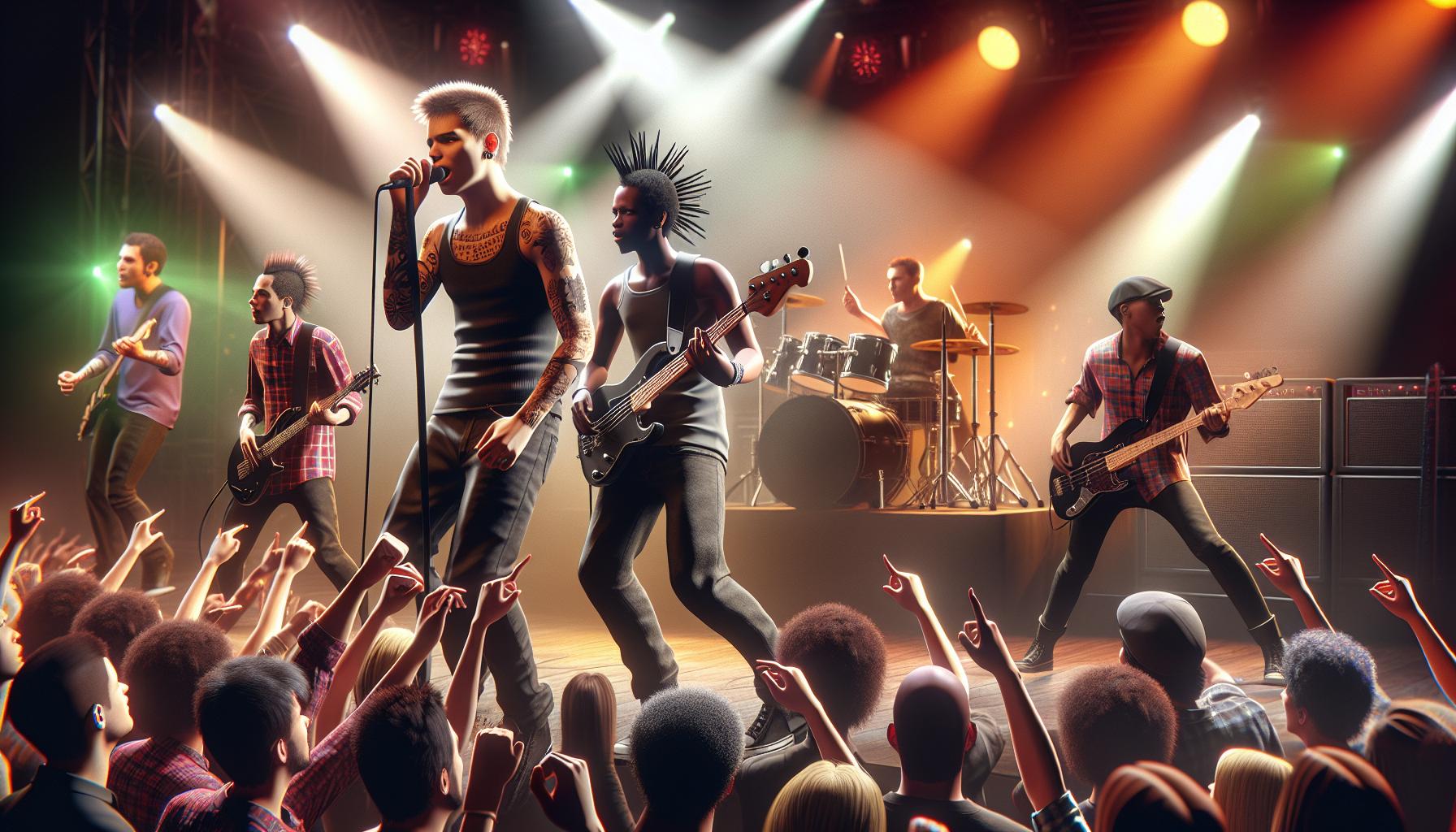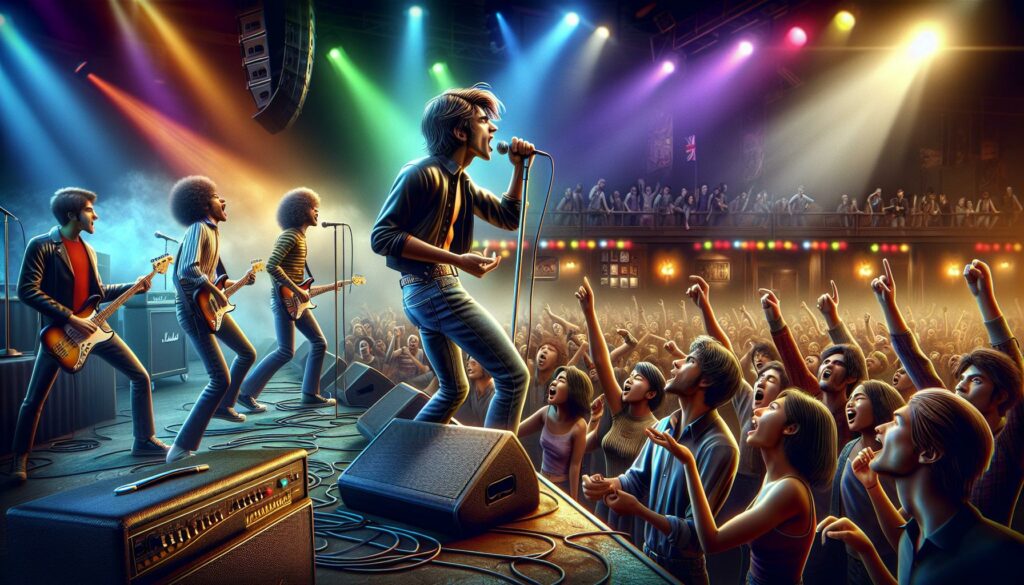The 2000s marked a vibrant era for rock music, blending genres and pushing boundaries like never before. As I reflect on this dynamic decade, I can’t help but remember the electrifying sounds that defined a generation. From the rise of pop-punk to the resurgence of alternative rock, the music scene was alive with innovation and energy. Bands like Linkin Park and The Strokes captured the spirit of the times, while legendary acts like Foo Fighters continued to evolve. This was a period where rock embraced new influences, creating a rich tapestry of sound that still resonates today. Join me as I dive into the highlights and trends that made 2000 rock music unforgettable.
- Diverse Evolution: The 2000s saw rock music evolve with an exciting mix of genres, including pop-punk and alternative rock, leading to innovative sounds and influential bands.
- Iconic Bands: Key artists like Linkin Park, Green Day, and My Chemical Romance defined the era with memorable albums and chart-topping hits that resonated with audiences worldwide.
- Cultural Impact: Rock music of this decade played a significant role in shaping youth identity, fashion trends, and social movements, often addressing themes of rebellion and self-identity.
- Emerging Subgenres: The rise of subgenres, such as emo and indie rock, reflected shifting musical tastes and contributed to the richness of the rock genre during this time.
- Critical Acclaim: Notable albums like “American Idiot” and “Hybrid Theory” received widespread praise, showcasing the artistic innovation and cultural significance of 2000 rock music.
- Festival Culture: Music festivals like Coachella and Warped Tour became cultural hubs, promoting diverse lineups and connecting fans while celebrating the evolving nature of rock music.
2000 Rock Music
The 2000s presented a dynamic evolution in rock music, characterized by diverse styles and noteworthy bands. Pop-punk surged to prominence during this decade, with groups like Blink-182, Green Day, and My Chemical Romance at the forefront. Their catchy melodies and relatable lyrics resonated with a young audience, positioning them as cultural icons.
Alternative rock continued to thrive, showcasing bands such as The White Stripes and Radiohead, who pushed creative boundaries. The blend of rock elements with electronic sounds marked a significant shift, exemplified by bands like Linkin Park and their groundbreaking fusion of nu-metal and hip-hop.
Legendary acts maintained relevance by experimenting with new sounds. The Foo Fighters produced hits like “Everlong” and “Best of You,” solidifying their status as rock mainstays. Meanwhile, artists such as The Killers brought a fresh take on rock with their compelling blend of new wave and indie rock.
The era also witnessed an increase in female-led rock acts, with artists like Alanis Morissette and Paramore gaining significant recognition. Their bold expressions and unique styles contributed to the genre’s diverse landscape.
The 2000s’ rock music scene reflects a rich tapestry of sounds and influences, making it a memorable decade that shaped the future of the genre.
Major Bands and Artists

The 2000s featured a variety of influential bands and artists that shaped the rock music landscape. Their contributions defined the sound of the decade, resonating with fans worldwide and influencing future generations.
Key Releases
Notable albums from this era include:
- “Hybrid Theory” by Linkin Park (2000): This debut album melded nu-metal and electronic elements, highlighting themes of inner struggles.
- “American Idiot” by Green Day (2004): A politically charged rock opera that revitalized punk rock, featuring hits like “Boulevard of Broken Dreams.”
- “The Black Parade” by My Chemical Romance (2006): This concept album brought theatricality back to rock, complete with anthems like “Welcome to the Black Parade.”
- “Elephant” by The White Stripes (2003): A raw, stripped-back album defined by garage rock revival, featuring tracks like “Seven Nation Army.”
- “In Rainbows” by Radiohead (2007): Released as a pay-what-you-want download, this album showcased experimental soundscapes and innovative distribution tactics.
Impact on the Genre
The 2000s significantly impacted rock music through genre blurring and the emergence of new styles. Pop-punk bands attracted mainstream attention, while alternative rock acts expanded sonic possibilities. Linkin Park’s fusion of rock and hip-hop elements paved the way for genre crossovers, influencing artists in various genres. The rise of female-led bands like Paramore and the continued success of artists like Alanis Morissette enriched the diversity of rock, demonstrating that the genre could evolve while retaining its core appeal. The decade laid the foundation for future rock movements, establishing a legacy that endures today.
Notable Songs and Albums

The 2000s produced a wealth of iconic songs and albums that defined rock music during the decade. Each contributed significantly to the genre’s evolution, showcasing diverse styles and influential artists.
Chart-Topping Hits
High-impact songs dominated the charts during the 2000s, many achieving critical acclaim and commercial success. For example:
- “In the End” by Linkin Park: Showcased the band’s genre-blending style, combining rock and hip-hop elements.
- “Boulevard of Broken Dreams” by Green Day: This anthem from American Idiot became a cultural touchstone for disillusioned youth.
- “Helena” by My Chemical Romance: Captured the essence of emo with its emotionally charged lyrics and powerful melodies.
- “Seven Nation Army” by The White Stripes: The instantly recognizable riff brought garage rock back into the mainstream spotlight.
These tracks not only topped the Billboard charts but also showcased the era’s lyrical depth and musical innovation.
Critical Acclaim
Numerous albums released in the 2000s received widespread critical praise for their artistic merit and groundbreaking techniques. For instance:
- Linkin Park’s Hybrid Theory: This debut album achieved multi-platinum status and is regarded as a cornerstone of nu-metal.
- Green Day’s American Idiot: A rock opera that earned numerous accolades, including a Grammy Award, praised for its political themes and sonic cohesion.
- My Chemical Romance’s The Black Parade: Lauded for its ambitious concept and theatrical sound, this album solidified the band’s status in the emo genre.
- Radiohead’s In Rainbows: Released as a pay-what-you-want download, this innovative approach garnered critical acclaim and showcased the band’s evolution in sound.
These albums exemplified the artistic innovation and cultural relevance that defined rock music during the 2000s.
Musical Trends and Characteristics

The 2000s featured a transformative landscape in rock music, driven by innovation and creativity. As bands explored new sounds, the characteristics of rock evolved in profound ways.
Evolution of Rock Sound
Rock music in the 2000s embraced a blend of genres, resulting in diverse soundscapes. Bands integrated elements from electronic music, hip-hop, and punk, leading to unique sonic experiences. Linkin Park’s “Hybrid Theory” exemplified this shift, combining rock with rap and electronic influences. Other acts, like The Strokes and The White Stripes, contributed a raw, garage-rock vibe that revitalized traditional sounds. The production techniques also advanced, enhancing audio clarity and depth through the use of technology, allowing more intricate arrangements and experimentation.
Subgenres Emerging in the 2000s
Various subgenres emerged during this period, reflecting the changing tastes of music fans. Pop-punk, led by bands like Blink-182 and Green Day, showcased catchy melodies and energetic rhythms. Emo rock gained traction through My Chemical Romance and Fall Out Boy, conveying deep emotions and personal narratives. Additionally, post-grunge bands like Nickelback and Creed appealed to mainstream audiences with polished sounds. Indie rock flourished, with artists like Death Cab for Cutie and Arcade Fire gaining critical acclaim by prioritizing artistic integrity and innovation over commercial success. Each subgenre contributed to a rich tapestry, defining rock music in the decade.
Cultural Influence of 2000 Rock Music
Rock music in the 2000s significantly shaped cultural landscapes, impacting fashion, youth identity, and social movements. Genres amalgamated, creating new sounds and subcultures that resonated with audiences worldwide. Bands like Green Day and My Chemical Romance emerged as voices for a generation, addressing themes of rebellion, disillusionment, and self-identity, which struck a chord with many young listeners.
Trends in fashion also mirrored the musical ethos of the time. Edgy styles characterized by skinny jeans, graphic tees, and vibrant hair colors became prominent, with fans often emulating their favorite artists’ looks. Social media facilitated the rise of these trends, allowing fans to connect and share their interpretations of rock’s influence, fostering communities centered around music.
The 2000s rock scene also promoted social activism. Green Day’s “American Idiot” tackled political unrest, invigorating a generation to engage in civic discourse and protest movements. My Chemical Romance’s “The Black Parade” encouraged conversations about mental health, challenging stigmas and providing solace for those struggling. These bands used their platforms to advocate for change, shaping opinions and promoting awareness on critical societal issues.
Music festivals gained popularity during this decade, serving as cultural hubs for rock music enthusiasts. Events like the Coachella Valley Music and Arts Festival and Warped Tour showcased diverse lineups, bringing together emerging and established acts. These festivals fostered connections among fans and highlighted the genre’s evolving nature, with audiences embracing new sounds along with classic rock elements.
The influence of 2000 rock music extended beyond the genre itself, intertwining with other art forms. Movies and television series integrated songs from iconic bands, amplifying their cultural relevance. Tracks like “Welcome to the Black Parade” and “Boulevard of Broken Dreams” found their way into popular media, further embedding rock music into the cultural fabric of the era.
The cultural influence of 2000 rock music permeated various aspects of life, from fashion to activism and media representation. This era defined a generation through its exploration of themes that fostered connection, self-expression, and dialogue regarding pressing social issues.
The 2000s were a transformative time for rock music that left an indelible mark on the genre. I’ve witnessed firsthand how bands pushed boundaries and explored new sounds, creating an era rich with diversity and innovation. This decade not only shaped the music we love but also influenced fashion and social movements, giving voice to a generation.
As we look back on this vibrant period, it’s clear that the legacy of 2000s rock continues to resonate today. The blend of genres and the emergence of new artists laid the groundwork for the future of rock music. I encourage you to dive deeper into this era and rediscover the tracks and albums that defined a generation.

